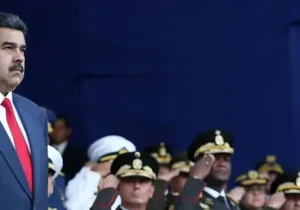The number of Venezuelan citizens fleeing their homeland continues to grow due to the ongoing political and socioeconomic crisis in the country. While most Venezuelans have fled to Colombia (and from there to other countries), many have crossed into Brazil and settled in Roraima, a state that borders Venezuela. The Brazilian government, broadly speaking, has been supportive of the Venezuelan refugees, but there have sadly been xenophobic incidents in recent weeks. As Brazil’s general elections are less than a month away on October 7, the question of what to do with these “others” has also become an electoral tool.
This situation is not new. When nations anywhere in the world receive an influx of migrants, the former can either be acceptive Good Samaritans of the latter, or turn a blind eye to their neighbors’ suffering. And the Bible tells us, “do to others what you would have them do to you” (Matt. 7:12).
The Situation Deteriorates
There are varying figures regarding how many Venezuelans have crossed into Brazil. A September 18 conference at the Center for Strategic and International Studies (CSIS) in Washington, DC, mentioned that there were an estimated 20,000 Venezuelan migrants and refugees in Brazil in 2017. Moreover, some media sources report that around 16,000 Brazilians applied for refugee status in the first half of 2018, and another 13,000 did so in 2017. Nevertheless, this influx of migrants in a relatively short time frame makes counting them properly difficult. The UN estimates that around 800 Venezuelans cross the border every day. According to different outlets, some Venezuelans cross the border to apply for refugee status while others who cross already have visas or even no documentation.
The Brazilian military has transported Venezuelan families to states like Parana to ease the pressure on Roraima. Unfortunately, as the crisis continues we can expect more Venezuelans seeking refuge in Brazil.
While the general population and government seem to support the Venezuelans, there have been troubling incidents. For example, in August a Brazilian judge ordered the closure of the border, though that order was ultimately rescinded. More xenophobic attacks against the Venezuelans took place in Roraima in mid-August when “a mob of Brazilians” attacked Venezuelans because a business owner reported migrants had robbed him. Unfortunately, social media exacerbated the situation when some incorrectly claimed that the victim had been murdered. Because of the attack, an estimated 1,200 Venezuelans fled back across the border. According to the Venezuelan daily El Nacional, four Venezuelans in fact robbed the business owner, but neither he nor his spouse was murdered. Sadly, one (certainly deplorable) incident and a lie were enough to promote a violent attack against innocent Venezuelans.
Many residents of Roraima appear to accept the Venezuelan refugees. But after the mob attack, a local hotel owner was less charitable: “We have finally cleaned the city of the undesirable, who did not want to work and spent all day in the street not doing anything. Now [the town of] Pacaraima is pretty and clean like before. And I hope it stays like that.”
Xenophobia as a Political Tool
Equally troubling is that the Venezuelan refugees are becoming part of the political discourse leading up to Brazil’s general elections on October 7, and the aforementioned incident showcases what is on the Roraiman electorate’s mind. At a September 4 on-the-record conference on Brazil’s elections at the Wilson Center in Washington, DC, experts on Brazil explained that Roraima favors Jair Bolsonaro, the controversial right-wing presidential candidate, because of his populist and extremist rhetoric. Regarding the Venezuelan question, the candidate has declared that he favors creating refugee camps, as the Venezuelans “are causing instability” in the city of Boa Vista, Roraima.
This situation should be familiar to the reader. A country receives an unexpectedly large number of immigrants who speak another language and have different customs. While some locals are willing to accept their fellow human beings in need, others distrust these “others.”
Even more, certain political movements can resort to extremist rhetoric to capitalize on local populations’ resentments and concerns. For instance, the far-right, anti-immigration Sweden Democrats won a significant number of votes in Sweden’s election this month. An NPR analysis of this election explained that the party “scored about 18 percent of the vote, up from 13 percent in the last election, as many voters took a stand against recent record immigration to the country, a strain on social services that some have linked to that, and rising numbers of shootings in areas with high immigrant populations.” Similarly, US President Donald Trump has focused on undocumented migrants to the US, and even friendly governments (i.e., Canada), as the sources of US problems.
Final Thoughts
Developed nations like Sweden or the US continue to receive a steady stream of refugees that escape poverty, violence, and instability in their homelands. Similarly, the crisis in Venezuela has turned nearby developing nations, like Brazil, into recipients of refugees who search for a better life. Without a doubt, Brasilia, Stockholm, and Washington cannot accept an endless flux of refugees without taking into consideration how a sudden demographic shift may impact the country’s own population, positively or negatively.
At the same time, compassion and empathy are key aspects of what makes us human. Thus, migration policies should be rational, but also humane. The masses escaping Venezuela or the conflict areas in the Middle East are not doing so because they want to, but because they have to, and the occasional “rotten apple” (like Venezuelan criminals in Brazil) should not promote hate toward all migrants.
—
Wilder Alejandro Sanchez is an analyst who focuses on geopolitical, military, and cybersecurity issues. The views expressed in this article are those of the author alone and do not necessarily reflect those of any institutions with which the author is associated.
Photo Credit: Venezuelan refugees in Boa Vista, Brazil. By Marcelo Camargo for Agência Brasil, via Wikimedia Commons.







 Sponsor a student for Christianity & National Security 2024
Sponsor a student for Christianity & National Security 2024